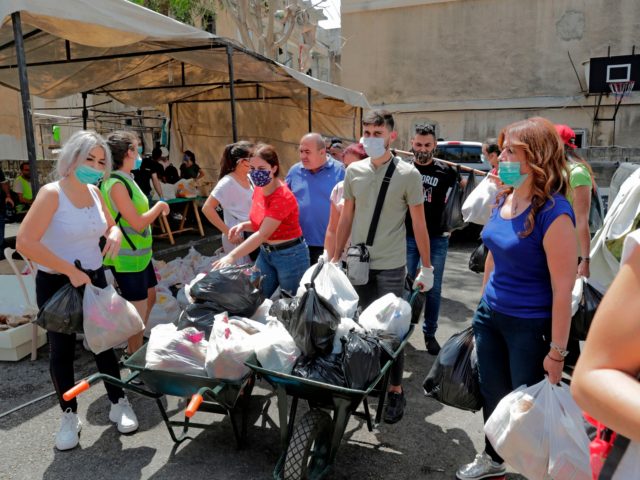Lebanese officials on Wednesday hastened to reassure the public imported goods, including foodstuffs, will not be seriously hindered by last week’s massive explosion in Beirut, even though the blast destroyed the city’s vital port facilities.
The government also insisted reserves of essential materials like flour are adequate despite a United Nations report to the contrary.
It is understandable that what remains of Lebanon’s government would want to keep panic over a possible food shortage from joining the country’s long list of woes, but economy minister Raoul Nehme might have strained what little credulity the public retains by claiming Lebanon faces “no difficulties with the flow of goods from abroad,” as the Daily Star put it.
Nehme also insisted Lebanon has 32,000 tons of flour safely stored in its reserves, which added to 110,000 incoming tons plus a 50,000-ton emergency relief shipment from the World Food Program means “we have enough for four months.”
On Tuesday, the United Nations reported that Lebanon’s flour supply was down to only six weeks, while Reuters reported that Lebanon’s private stocks of grain were obliterated in the August 4 explosion, and the government kept no strategic reserve of grain to back up the privately-owned inventory. Nehme admitted on Friday that plans to create a 40,000-ton reserve of wheat were not implemented before the explosion.
Lebanon was already dealing with a food crisis before the explosion, with prices soaring so high that shop owners were reluctant to allow reporters to reveal them. Nehme’s agency estimated food inflation at almost 250 percent in June. Bread, flour, and rice were among the items most difficult to find after a round of panic buying in the spring as the Lebanese currency collapsed.
The World Food Program assessed that Beirut’s “grain silos have mostly been destroyed, causing fears of skyrocketing food prices” when it announced its plan to ship 50,000 tons of wheat to the city. Most of Lebanon’s grain has been imported since the government stopped buying from local farmers years ago.
“Even before this tragedy, too many children were going to bed hungry. The far-reaching implications of the blast will only put more pressure on families already on the brink,” U.N. humanitarian coordinator Najat Rochdi said on Tuesday.
On the positive side, Al Jazeera News reported on Wednesday that the Port of Beirut has “resumed partial operations to secure goods for local markets.” Nehme was quoted in the report stating that 12 of the 16 loading cranes at the port are operational. If the port cannot function, container ships must be diverted to Tripoli, which is over 50 miles away.
Nehme, along with the rest of the Lebanese cabinet, technically resigned on Monday, but President Michel Aoun asked the departing officials to remain as caretakers until a new government could be formed. Nehme was appointed economy minister in January by Prime Minister Hassan Diab, who also resigned this week.
The day after the explosion, Nehme told NPR that the site of the explosion resembled an “apocalypse,” every structure was “flattened in the place where the explosion happened,” and the storage silos were “practically destroyed.”
“I don’t think we will be able to recover any part of it, which is a big problem for Lebanon. Warehouses burned down, destroyed entirely. Everything is destroyed. It’s absolutely terrible,” he said.
Public demonstrations against the Lebanese government continued on Wednesday, with demands for President Aoun to step down. Aoun has given little indication he intends to resign, instead assuring the public that he “will not rest until all the facts are known.”

COMMENTS
Please let us know if you're having issues with commenting.